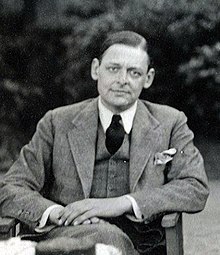
Back T.S. Eliot Afrikaans Thomas Stearns Eliot ALS ቲ.ኤስ. ኤልየት Amharic T. S. Eliot AN ت. س. إليوت Arabic ت. س. اليوت ARZ টি এছ ইলিয়ট Assamese T. S. Eliot AST Thomas Stearns Eliot AVK T.S. Eliot Aymara
T. S. Eliot | |
|---|---|
 Eliot in 1934 | |
| Born | Thomas Stearns Eliot 26 September 1888 St. Louis, Missouri, U.S. |
| Died | 4 January 1965 (aged 76) London, England |
| Occupation |
|
| Citizenship |
|
| Education | |
| Period | 1905–1965 |
| Literary movement | Modernism |
| Notable works |
|
| Notable awards |
|
| Spouses | |
| Parents | |
| Relatives | Eliot family |
| Signature | |
Thomas Stearns Eliot OM (26 September 1888 – 4 January 1965) was a poet, essayist and playwright.[1] He was a leading figure in English-language Modernist poetry where he reinvigorated the art through his use of language, writing style, and verse structure. He is also noted for his critical essays, which often re-evaluated long-held cultural beliefs.[2]
Born in St. Louis, Missouri, to a prominent Boston Brahmin family, he moved to England in 1914 at the age of 25 and went on to settle, work, and marry there.[3] He became a British subject in 1927 at the age of 39 and renounced his American citizenship.[4]
Eliot first attracted widespread attention for his poem "The Love Song of J. Alfred Prufrock" from 1914 to 1915, which, at the time of its publication, was considered outlandish.[5] It was followed by The Waste Land (1922), "The Hollow Men" (1925), "Ash Wednesday" (1930), and Four Quartets (1943).[6] He wrote seven plays, notably Murder in the Cathedral (1935) and The Cocktail Party (1949). He was awarded the 1948 Nobel Prize in Literature, "for his outstanding, pioneer contribution to present-day poetry".[7][8]
- ^ Bush, Ronald. "T. S. Eliot's Life and Career", in John A Garraty and Mark C. Carnes (eds), American National Biography. New York: Oxford University Press, 1999, via [1] Archived 2022-04-17 at the Wayback Machine
- ^ "T.S. Eliot | Biography, Poems, Works, Importance, & Facts | Britannica". Britannica.com. Retrieved 12 April 2023.
- ^ "The Nobel Prize in Literature 1948". NobelPrize.org. Retrieved 20 April 2021.
- ^ Sanna, Ellyn (2003). "Biography of T. S. Eliot". In Bloom, Harold (ed.). T.S. Eliot. Bloom's Biocritiques. Broomall: Chelsea House Publishing. pp. (3–44) 30.
- ^ Eliot, T. S. (21 December 2010). The Waste Land and Other Poems. Broadview Press. p. 133. ISBN 978-1-77048-267-8. Retrieved 9 July 2017. (citing an unsigned review in Literary World. 5 July 1917, vol. lxxxiii, 107.)
- ^ "Thomas Stearns Eliot", Encyclopædia Britannica. Retrieved 7 November 2009.
- ^ "The Nobel Prize in Literature 1948". Nobel Foundation. Retrieved 26 April 2013.
- ^ "The Nobel Prize in Literature 1948 – T.S. Eliot", Nobel Foundation, taken from Frenz, Horst (ed). Nobel Lectures, Literature 1901–1967. Amsterdam: Elsevier Publishing Company, 1969. Retrieved 6 March 2012.